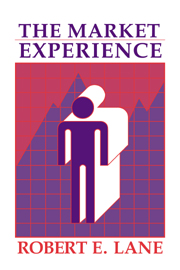Book contents
- Frontmatter
- Contents
- Acknowledgments
- Part I Introduction
- Part II Cognition and emotion
- Part III Self-attribution and self-esteem
- Part IV Human relations
- Part V Work
- 13 Learning at work: beyond human capital
- 14 Degradation of work in the market?
- 15 Distributing workplace learning
- 16 Giving work priority over consumption
- Part VI Rewards
- Part VII Utility and happiness
- Part VIII Conclusion
- Author index
- Subject index
13 - Learning at work: beyond human capital
Published online by Cambridge University Press: 18 December 2009
- Frontmatter
- Contents
- Acknowledgments
- Part I Introduction
- Part II Cognition and emotion
- Part III Self-attribution and self-esteem
- Part IV Human relations
- Part V Work
- 13 Learning at work: beyond human capital
- 14 Degradation of work in the market?
- 15 Distributing workplace learning
- 16 Giving work priority over consumption
- Part VI Rewards
- Part VII Utility and happiness
- Part VIII Conclusion
- Author index
- Subject index
Summary
The germs of the education of the future are to be found in the factory system. This will be an education which, in the case of every child over a certain age, will combine productive labor with instruction and physical culture, not only as a means of increasing social production, but as the only way of producing fully developed human beings.
Karl Marx, CapitalIntroduction
What do working activities contribute to happiness and human development? I must defer the discussion of happiness through work to Part VI, however, in this chapter I will report research showing how selected work practices alter world views, improve cognitive complexity, impart a sense of personal control, and enhance selfesteem. Rather than change occupational values, work experience tends to reinforce those values held prior to work and sometimes to stimulate curiosity about the world outside the work setting, increase empathy for the weaker members of a work team, and lead to more challenging leisure activities. For the sake of simplicity, I will call the acquisition of these values and insights by the simple, but here specialized, term of workplace learning or simply learning.
The initial discussion of the concept of work is useful as a contribution to clarity, of course, but it has the added advantage that it facilitates dealing with the sometimes vague border between work and leisure, and so will help us later to treat an idea competing with our notion of work as the source of fulfillment, namely, that it is in their leisure, not their work, that people fulfill themselves.
- Type
- Chapter
- Information
- The Market Experience , pp. 237 - 259Publisher: Cambridge University PressPrint publication year: 1991



